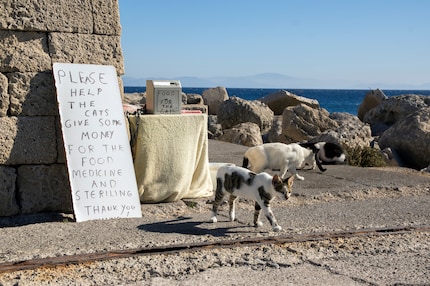
Guide
Animal rights: real fur, fake fur or second-hand - what's okay?
by Darina Schweizer

If you’re the kind of person to worry about the skinny stray animals during your summer holiday, listen carefully. Caroline Mulle from «Tier im Recht» (Foundation for Animals in the Law) reveals how you can help the four-legged friends – and why adoption isn’t always the best solution.
Can you feel that summer breeze already? The summer holidays are coming and for a true summer baby like me it’s the highlight of my year. But one thing always saddens me when I’m abroad: the homeless animals.
There’s almost nothing to them and I wish I could give them a new home. But is that the best idea? I asked Caroline Mulle, a legal researcher at Tier im Recht.
Caroline Mulle, it’s almost the holidays. For some, a holiday souvenir isn’t enough, they also bring pets back with them. Would you recommend this?
No. Although often well-intentioned, taking animals home doesn’t solve the problems in their respective countries. The animals would often be happier in the country they were born in, if they were properly cared for. Many people underestimate the effort and challenges at home.
What do you mean?
Stray animals often need a lot of patience and empathy and may struggle with certain situations for the rest of their lives. Although they’re great animals, you have to be prepared to adapt your life to their needs. But many people don’t consider this and are overwhelmed when settling them in and raising them ...
... and then the four-legged friends end up in our already overcrowded Swiss animal shelters?
Unfortunately, that is often the case, yes.
So you’d advise against taking hungry stray cats home with you?
Yes. Of course, you can feed cats and dogs with harmless food. If you want to make a lasting commitment to animals abroad, it’s preferable to support a local animal welfare organisation that also carries out castration campaigns.

But if I’ve fallen in love with a stray dog and want to take on the effort and risks, when can I import it and when not?
First things first, dogs with cropped ears and/or tails can’t be imported. The dog has to be at least 56 days old. And younger animals must be accompanied by an adult animal that can suckle them. You should be particularly careful in countries where there’s a risk of rabies, such as Serbia, Indonesia, Albania, Costa Rica and China.
Why?
You have to meet more comprehensive import requirements there. This includes a vaccination, a waiting period, a positive antibody test and a permit from the Federal Food Safety and Veterinary Office (FSVO) if imported directly by air. Plus, the animals have to be at least seven months old, otherwise the waiting periods can’t be met.
What else do I need to look out for?
For the border crossing into Switzerland to be considered a private import, you’re not allowed to carry more than five animals, the animals must be accompanied by their owner when crossing the border and they can’t be sold or given away in Switzerland afterwards. You also need a pet passport from the vet treating your pet.

What should you expect if you don’t comply with all regulations?
There’s a risk that they’ll confiscate the animals at border control and unfortunately they often euthanise them. You’re also liable to prosecution. So it’s important to ask all the questions in advance. The FSVO has a handy online tool if you’re unsure about anything.
If I don’t want all the bureaucracy, can I buy foreign animals online that have already been placed in Switzerland?
I wouldn’t advise it. Even an organisation isn’t necessarily a guarantee for a serious placement. Plus you should always see the animal before you buy it.
Why?
It’s crucial to get an idea of how the animal has been kept up to now. You can also get to know each other and assess whether you’re a good match. Animals therefore shouldn’t be «ordered» on the internet. This is almost certainly a case of animal trafficking.
How can you tell if they’re reputable providers?
That’s pretty difficult. The seller should at least provide information on the animal, such as the breed, origin, country of breeding, vaccination and deworming. If they share details about themselves and the possibility of a visit, especially in a foster home, it’s also a good sign. Reputable sellers want to get to know the new owners and are usually available to answer questions after the purchase. But you can never be completely sure.
My opinion after the conversation with Caroline Mulle is clear. I won’t import any animals from abroad, as sorry as I feel for the strays. Ultimately, I’d be doing more for animal welfare if I adopted a four-legged friend from a Swiss animal shelter.
Have you ever adopted an animal from abroad or considered doing so? Let me know in the comments!
I love anything with four legs or roots - especially my shelter cats Jasper and Joy and my collection of succulents. My favourite things to do are stalking around with police dogs and cat coiffeurs on reportages or letting sensitive stories flourish in garden brockis and Japanese gardens.
Practical solutions for everyday problems with technology, household hacks and much more.
Show all